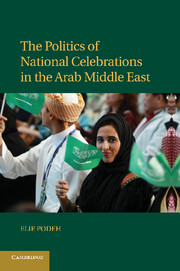4 - Iraq
Changing Regimes, Changing Celebrations
Published online by Cambridge University Press: 05 July 2011
Summary
THE MONARCHY (1921–1958)
In April 1920, the San Remo Conference assigned the Iraqi mandate to Britain. The decision sparked a local rebellion two months later, known as the Revolution of the Twenty (Thawrat al-‘Ishrin), which was swiftly quelled by the British. According to the Iraqi historical narrative, it was a national rebellion against the colonial power, and as such it would later enter the canonical historical narrative. Meanwhile, on 1 October 1920, Sir Percy Cox assumed his responsibilities as high commissioner. In March 1921, the Cairo Conference, headed by Winston Churchill, then minister of the Colonial Office, laid down the pillars of the Iraqi state, conceived as a monarchy, to be headed by Faysal, the third son of Sharif Husayn from the Hijaz, whom the French had evicted from Syria in July 1920. Britain's first task was to ensure a successful and legitimate process by which Faysal would be crowned king of Iraq.
Making a New Tradition: Faysal's Crowning
Emir Faysal arrived in Iraq in June 1921, after his ouster from Damascus by the French (see Chapter 2). On 11 July, the appointed Iraqi Council of Ministers declared him king, provided that his government would be constitutional, representative and liberal and limited by law. To obtain the endorsement of the local population, Cox declared that it must be confirmed by a referendum. The British closely supervised a bogus plebiscite, which resulted in the almost unanimous approval (96%) of Faysal's candidacy.
- Type
- Chapter
- Information
- The Politics of National Celebrations in the Arab Middle East , pp. 108 - 167Publisher: Cambridge University PressPrint publication year: 2011



